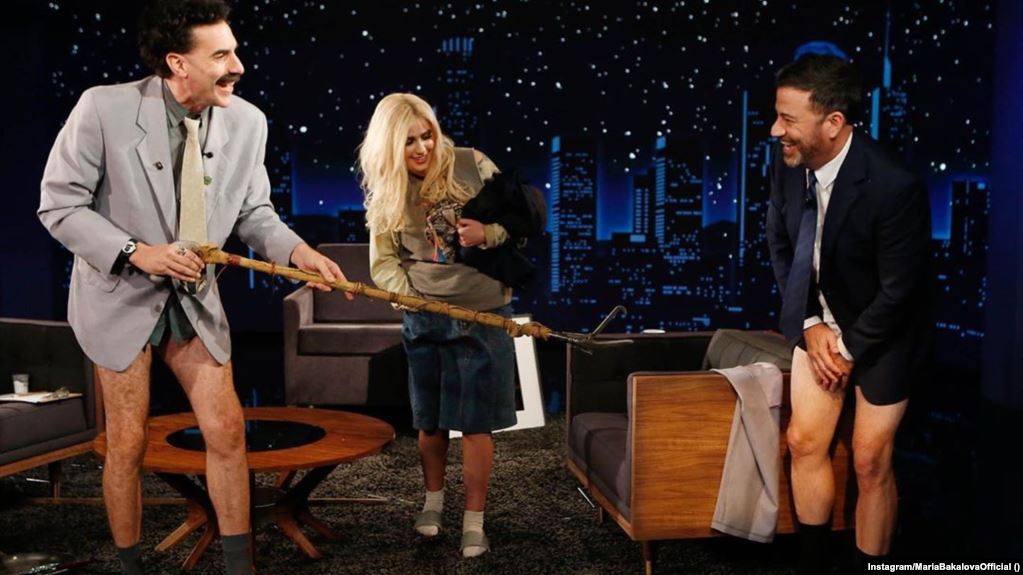
Review by Emily Matthiessen
Tricksters have been part of the human story since the beginning. Anansi, Raven, and Coyote spring to my mind, but you can find tricksters of all forms in mythology across the human diaspora. When evil oppresses the people, tricksters relieve their suffering with humor. Where there is a preponderance of pomposity, an overwhelming amount of ego, a trickster arrives with a little needle of perception to puncture it. People of strong ethics can withstand a match with these characters, but most people come out with their weaknesses exposed. Tricksters appear in real life as well. Some people’s mission in life is to point out the follies of others using deception, humor, roguishness, and other useful tools. Sacha Baron Cohen is a trickster of our time.
In “Borat, Subsequent Movie Film,” the British actor teamed up with the outstanding Bulgarian actress Maria Bakalova to play Borat and his daughter, Tutar. (By the way, Tutar is very close to the Estonian and Finnish words for daughter.) In the process of creating the film, they hoodwinked Americans from South Carolina to Washington State to New York and Washington, D.C. As in his previous film, Cohen whittled out the story from footage shot with actors and regular people. These non-actors had varying degrees of understanding about what they were participating in. Few people know the entire story of what went on in this massive prank to expose American culture.
Like the best of literature, this movie can engage its audiences on multiple levels, from the geographically-vague simple story-line with the twist at the end to a complex analysis of modern American cultural and individual behavior. The plot centers around a father on a mission to bribe the U.S. Government on behalf of the Kazak Government who meets the daughter he didn’t know he had. Together they embark on a journey of personal evolution that ends with them happy and with COVID-19 devouring the vulnerable of the world.
Cohen is an equal-opportunity rogue. He gives everyday Americans—from those who were roped into his scheme to those watching the movie and its promotion—and famous, powerful Americans the opportunity to examine their own perceptions of reality.
Even before the movie was available to watch, it pulled people in with its powerful promotional campaign. On Twitter, people were teased with images of personal lawyer to the U.S. President, Rudy Giuliani, fiddling with the intersection between his shirt and pants while laying on a hotel bed alone with Tutar just in time to intercept Rudy’s story about the President-Elect’s son and a laptop. Video clips showed intriguing interactions between the actors and other Americans. I know the promotion was successful because for the first time in my life I chose to watch a movie on its first day out.
Indications that Borat was up to something in the U.S.A. floated about the Web, but it wasn’t until after the movie came out that people began to see how it all fit together. I myself had watched recordings from people in Olympia, Washington, who witnessed the elaborate masquerade of Borat as a rabidly prejudiced country singer encouraging the crowd at an alt-right rally to participate in a horrible song. I never guessed that it was part of such an important movie, but I appreciated it for the value of the prank.
Borat, as trickster, is breathtakingly powerful to observe in action. Tricksters are needed in times of great evil, but the skills they employ aren’t necessarily benign. It’s a kind of ends-justify-the-means situation, and so sometimes people and their sensitivities do get hurt. Taboos are broken with bloody flair. Entire nations, like Kazakhstan, become the butt of unfair jokes. People’s morality and intelligence are exposed, often the two do not align. I can think of only three people who came out of this movie as shining examples of the best of humanity. Other people showed themselves as good-hearted and deluded, like the Washington state conspiracy suckers who welcomed Borat into their home during the pandemic. The majority of the Americans showed up as tolerant, often tolerant of behaviors we shouldn’t tolerate, even behaviors that indicated human trafficking and child abuse. But of course, we can’t know what those people thought they were participating in, because like the Guiliani clip, the movie was artfully constructed from pieces filmed on the unsuspecting. By the way, I am not at all convinced that Giuliani wasn’t telling the truth when he said he was tucking in his shirt – it is entirely possible that as an old, overweight man he had to lie down to achieve it. And there is no indication that he thought Tutar was 15 (as people repeatedly accused him of thinking), because in the segment she was posing as a newsperson. Still, the irony of one who is known to tell lies about others being mocked and disbelieved when he tells the truth is both classic and satisfyingly amusing.
The reactions on the Web vary as to which person in the movie was the most disappointing, but for me, the religious man serving at the woman’s health center in South Carolina was the most abhorrent.
People who shouldn’t watch this R-rated movie include children (truly), and those who can’t handle imagery related to male and female anatomy and the biological behavior of its possessors. Sometimes the tricksters make their points in the crudest or raunchiest way. There are plenty of people who aren’t amused by that. Those of us who are shocked, or laugh and are uncomfortable, are again presented with the opportunity to self-examine our relationship with the messy human body. Then again, sometimes the jokes are stupid.
For the student of mythology or the lover of tricksters, for the admirer of rogues, for the ones who study human behavior and the people who investigate how things are made, this film can be fascinating. The ways that people reveal themselves when they are tricked by the strange characters of Borat and Tutar reveals something about our culture as well. Whether good, evil, or neutral, the people in the movie were much more tolerant than people on social media. They are much more like the people I encounter than the people depicted on television. And while a bit appalled by the low-intelligence and gullibility often shown, I am heartened by the tolerance and good-nature revealed by many of the Americans in the film.




